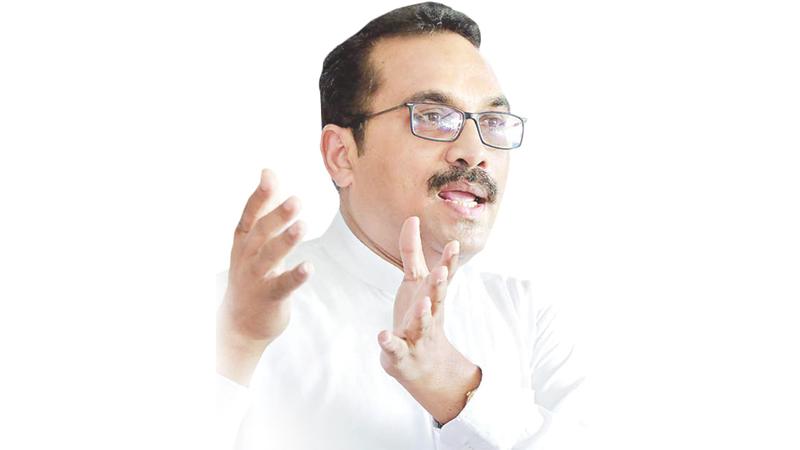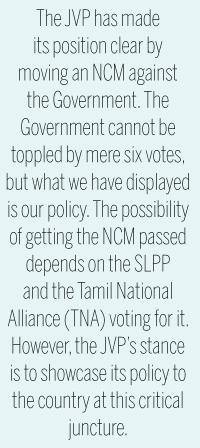
Following the April 21 Easter Sunday attacks, the Janatha Vimukthi Peramuna (JVP) has presented a No Confidence Motion (NCM) against the Government only to be accused of being stooges of the United National Party (UNP). But Parliamentarian Bimal Rathnayake vehemently denies that the No Confidence Motion presented by the party is a contract of the United National Party or an attempt to derail the NCM against Minister of Industry and Commerce Rishad Bathiudeen. Instead, he claims the move is the party’s bid to voice its stance against a government failing to protect its citizens.
In an interview with the Sunday Observer, Rathnayake also expressed his views on the release of controversial Bodu Bala Sena monk from prison and the reinstatement of kidnapping suspect Major Bulatwatta to the Army Chief’s inner circle.
Excerpts from the interview:
Q : The Joint Opposition has brought forward a NCM against Minister Rishad Bathiudeen. Will the JVP extend its support to this?
 A. The leaders of the country deserves a No Confidence Motion (NCM). They have failed in their responsibility in governing the country. As for the NCM brought against Minister Rishad Bathiudeen, the JVP believes he clearly deserves it.
A. The leaders of the country deserves a No Confidence Motion (NCM). They have failed in their responsibility in governing the country. As for the NCM brought against Minister Rishad Bathiudeen, the JVP believes he clearly deserves it.
But the NCM brought against Bathiudeen attributing the sole responsibility for the Easter Sunday attacks to him is diluted and defends those who are truly responsible for them. We can see a racist element in the NCM along with an attempt to absolve some of the culprits due to political deals. The JVP has not made a final decision to vote when the NCM is taken up in Parliament.
Q : The JVP has presented its NCM against the Government. But it is alleged that it is a move to help the UNP and also to derail the NCM against Bathiudeen. Is there any truth in these accusations?
A. When citizens fall victim to such a dastardly crime as the Easter Sunday attacks, why cannot the Sri Lanka Podujana Peramuna (SLPP), the party with the most seats in the Opposition, bring an NCM against the Head of State and the Government, instead of blaming one Minister? Does this not mean that the SLPP is clearly protecting the UNP?
Had the security agencies found explosives, weapons or training camps within his knowledge, then at least, the NCM can be justified. In any country, the national security is the main responsibility of the Head of State, Prime Minister and the Minister of Defence. Does not the failure on the part of the SLPP amount to helping the UNP? In similar situations, a NCM is brought against the Heads of Government and not against those in the sidelines.
Q :What is the rationale behind the NCM against the Government?
A.The events which occurred on April 26 warrant an impeachment against the President and an NCM against the Government. It is public knowledge that the Head of State failed to issue necessary instructions and convene a security council meeting although intelligence information was available. However, the JVP with only six MPs cannot bring in an impeachment against the President.
Instead, we decided to bring an NCM against the Government. The JVP believes the Government must step down and a General Election needs to be held. The rulers are incapable of running the country and drive it towards anarchy.
The JVP has made its position clear by moving an NCM against the Government. The Government cannot be toppled by mere six votes, but what we have displayed is our policy. The possibility of getting the NCM passed depends on the SLPP and the Tamil National Alliance (TNA) voting for it. However, the JVP’s stance is to showcase its policy to the country at this critical juncture.
Q : Has the JVP identified its role in the current scenario?
A.In the recent past, we witnessed that neither the Rajapaksa nor the Wickremesinghe camp can develop the economy, ensure good governance along with democracy and fight corruption. Therefore, the JVP was mobilising the people to the task of developing the country amidst crises relating to national security, extremism and racism. We believe we should prevail upon the Government to ensure the safety and security of the people. Secondly, we hope to do our utmost to contain extremism and radicalism and also foreign intervention following such attacks.
National security can only be ensured through unity among all the communities.
Q : In your opinion, what were the causes that led to Muslim extremism in Sri Lanka?
A.Communalism is still prevalent in Sri Lankan Society. Successive Governments were alleged to have paid lip service to the rights of the Tamils.
Though the Muslim Community have suffered injustices, they have not been marginalised. During the past 10 years, Sinhala and Muslim extremist elements were at work. Alutgama and Digana incidents were of much concern and hate speech campaigns against the Muslim community took place.
A space was created to nurture extremist elements within the Muslim community. But taking into consideration the scale of the attacks and the profile of the masterminds, this is clearly connected to international terrorism.
But Muslim religious leadership in the country has also contributed to the issue by not encouraging its community towards an inclusive society and has attempted to isolate them by limiting its interactions with others. The Muslim leadership has not supported its community to live in a multicultural society. Though the terror was carried out by Zaharan, Hashim and global terrorism, the religious controls of everyday life by Muslim religious leaders contributed to create an environment which fostered extremism.
Q : Some have claimed the attacks were a result of the collapse of the intelligence services. What is your opinion on this?
A.The collapse was of the entire security apparatus. When prior warnings had been given but still the attacks took place, no one can deny that the security apparatus has collapsed. But this does not mean the intelligence services were weakened by the arrest of those who were involved in the kidnappings of civilians for ransom and killing of journalists during the Rajapaksa regime. Some seem to think that the intelligence services collapsed with the imprisonment of these criminals.
After 2015, in the power struggle for the Presidency, security concerns and the security council were forgotten. It was more of a failure of the security administration apparatus. In recent times, the law enforcement was able to nab drug kingpins due to intelligence information being gathered. The political apparatus is manipulating the law enforcement and security forces for its political campaigns.
Q : A suspect in several cases of attacks on journalists, Major Prabath Bulatwatta, was appointed to a special team under the Army Chief. Was this right?
A.When officers who have been accused of crimes are given such importance, honest officers get demoralised. Someone might argue that Bulatwatta is only a suspect, but the allegations are of a serious nature.
The current Army Commander was also driven away by the Rajapaksas and only returned in 2015. The terror that regime unfolded was done with the assistance of people, such as Bultwatta. A country’s security, democracy and human rights must go hand in hand. Democracy and human rights cannot be done away with solely for the purpose of ensuring security.
Q : There is the talk of postponing the Presidential Election. What is the JVP’s take on this?
A.This is unlikely. Some leaders may think they will be able to do so due to the current situation in the country. But if the matter is taken to courts, then we are unsure as to what its decision will be.
Q : What is your opinion on the recent release of Bodu Bala Sena Leader Galagoda Aththe Gnanasara Thera from prison?
A.Imprisonment of any person is similar to ending his life. Therefore, it may be inhuman to disagree with the release of a prisoner according to existing laws of a country.
But on the other hand, there is a serious political, policy and social deterioration behind the release of Gnanasara Thera. The Thera is someone who stoked the fire of racism in Sri Lanka. Some of the radicalised youth arrested after the recent attacks claimed that more youth joined the National Thowheed Jamath (NTJ) after the Digana attack.
It it public knowledge that Gnanasara Thera visited the house of a man killed in the Digana incident and delivered a sermon. When Presidential pardon is given to such a person, a breakdown of political morality is possible.
Also the time at which the monk is being released is a matter of concern. We are trying to not only combat Muslim extremism but Sinhala extremism as well. Therefore releasing someone with extremist views will only strengthen Muslim extremism. Muslim extremists can use this as an example to convince moderate Muslims of their ideology. Also the complainant against Gnanasara Thera was a judge and the decision was given by the Court of Appeal. Releasing him in this manner without any regard to courts appears to be a political ploy for election purposes. This move will set a bad precedent.
Q : What are JVP’s proposals to foster peace and reconciliation in the country?
A.The JVP will present a comprehensive plan for this purpose in June. We will focus on reforms in schools to create a more inclusive society and reforms in media to prevent the spread of communalism. A proposal to establish an Anti-discrimination Commission will also be put forward.
